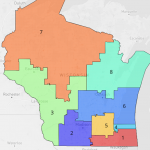Tax Hike Would Give City $50 Million Per Year
Barrett says proposed 1% sales tax hike would fund police, fire, streets, property tax relief.
The city’s dire budget situation could be at least partially relieved by the establishment of a one percent Milwaukee County sales tax.
The proposal, which needs approval from state government and a local referendum, would yield approximately $50 million annually to the City of Milwaukee from the $160 million in countywide funding it would generate.
The sales tax would be used by both the city and county to compensate for the steady reduction in state shared revenue the entities have received in recent decades. The city alone receives $105 million less from the state in inflation-adjusted dollars since 2003.
Mayor Tom Barrett told Urban Milwaukee in an interview that his priority for the potential funding is to spend that money on stabilizing the Milwaukee Police Department‘s personnel levels, purchasing a new medical emergency response vehicle for the Milwaukee Fire Department, investing in street repair and providing property tax relief.
Property tax relief is a key component of the proposal, introduced today by Milwaukee County Executive Chris Abele and the executives of each of the 19 Milwaukee County municipalities. Under the plan, 25 percent of the sales tax’s proceeds would be statutorily required to go towards property tax relief. Fifty percent of those relief funds go to the county (approximately $20 million) and the remaining 50 percent would be split among the county municipalities based on population. The city would receive approximately $12 million annually to offset its $281 million property tax levy.
“I’m hopeful that it will actually go down,” said Barrett of property tax bills. “It’s important that we are very transparent with the public so if it doesn’t happen there is an explanation for it.”
The city would also see an additional $37 million annually from the sales tax. Under the revenue sharing agreement in the proposal, the remaining 75 percent of the tax proceeds would be split evenly between the county and the municipalities. And while that pool of funding would be available to municipalities for discretionary needs, much of the proceeds coming to Milwaukee would go towards basic services the city has been forced to cut back on as its budget grew tighter.
“I want to make sure we do everything we can so that we can continue to have [police recruit] classes,” said Barrett. He said the city has been able to avoid layoffs, but that would become more difficult as police salaries rise. “To me it would be a mistake as we are literally seeing the city grow safer to start backing off that effort.” Homicides are down 17 percent year to date, and non-fatal shootings are down 21 percent. Barrett said funding would also go towards the Office of Violence Prevention.
The Milwaukee Police Department currently has an approximately $300 million budget, exceeding the city’s entire property tax levy. The MPD budget is expected to grow in coming years because of a state-regulated wage-settlement agreement that will raise salaries for officers while potentially forcing a reduction in the size of the police force.
“If I have this tool that goes into effect next year after a referendum, it will enable me to avoid some of the steps that I’m going to have to take if I don’t have the tool,” said Barrett.
The mayor made sure to praise the outside support the county-cities partnership is receiving.
“The business community has been supportive of our efforts,” said Barrett. “I think that’s very, very important. They now have an understanding of just how important it is for us to control our own destiny.” The proposal has the backing of Tim Sheehy of the Metropolitan Milwaukee Association of Commerce, businessman David Lubar, and Julia Taylor of the Greater Milwaukee Committee.
The proposal will require bipartisan support in the Wisconsin State Legislature to pass, something Barrett and Abele both say they’re working on. The effort is assisted locally by Representative Evan Goyke (D-Milwaukee) and Senator LaTonya Johnson (D-Milwaukee).
The referendum could end up on the ballot as early as April 2020, timed to coincide with the Democratic Party’s Presidential Primary as well as Common Council and Mayoral races. Barrett said if that happens, it would allow the city to use some of the funding in late 2020 for a police recruit class.
Barrett praised city employees Kimberly Montgomery, Brenda Wood, Jim Bohl and Dennis Yaccarino for their work on negotiating the deal with the county and other municipalities. The effort also has the support of Common Council President Ashanti Hamilton.
The proposal would raise the Milwaukee County sales tax rate to 6.5 percent, with an additional .5 percent on food and beverage purchases that is used to fund the Wisconsin Center District. The .1 percent sales tax for Miller Park is scheduled to end in 2020.
For more on the proposal, see coverage of the announcement by my colleague Graham Kilmer.
Rising Pension Costs
The city’s annual pension contribution is expected to more than double in four years, consuming an additional $90 million annually.
City officials avoided having to make any pension contributions from 2004 to 2009 despite the city charter requiring the system to be fully funded. But that run of luck ended as the Great Recession hammered the financial markets. Despite a strong stock market, the city is still playing catchup.
In 2019, the city will contribute approximately $70 million to the pension system. Approximately 80 percent of that will go to support public safety employees that are exempt from Act 10.
Following the shock of having to make a nearly $40 million payment in 2009, the city uses a five-year smoothing formula from an actuarial consultant. When the current term expires in 2023, consultants are warning city officials to expect to have to start paying $160 million annually.
According to the mayor’s office, the primary driver in the increase is a change in the expected performance of the system’s assets. The anticipated return has been reduced from eight percent to 7.5 percent annually.
If you think stories like this are important, become a member of Urban Milwaukee and help support real, independent journalism. Plus you get some cool added benefits.
More about the 1 Percent Sales Tax Proposal
- The State of Politics: The Debate Over Local Sales Taxes - Steven Walters - Feb 22nd, 2021
- Evers’ Budget Proposal Would Allow Milwaukee Sales Tax - Jeramey Jannene - Feb 12th, 2021
- WCA Applauds Governor Evers’ Sales Tax Option - Wisconsin Counties Association - Feb 12th, 2021
- MMAC Encourages Support for Evers Sales Tax Proposal - Metropolitan Milwaukee Association of Commerce - Feb 12th, 2021
- Gov. Evers Proposes Plan to Enhance Local Control, Bolster Local Communities’ Economic Recovery - Gov. Tony Evers - Feb 12th, 2021
- The State of Politics: Milwaukee Leaders Plead for 1% Sales Tax - Steven Walters - Mar 16th, 2020
- County Sales Tax Legislation Gets Hearing - Graham Kilmer - Mar 5th, 2020
- ‘Fair Deal’ Sales Tax Referendum Blocked From April Ballot - Corrinne Hess - Jan 30th, 2020
- Transportation: Bauman Wants 1.5 Percent Sales Tax - Jeramey Jannene - Sep 26th, 2019
- Review Board to Discuss Recent Sales Tax Proposal and its impact on Public Transit - Ald. Bob Bauman - Sep 23rd, 2019
Read more about 1 Percent Sales Tax Proposal here
More about the 2020 Milwaukee Budget
- City Hall: Council Overrides Every Barrett Veto - Jeramey Jannene - Nov 26th, 2019
- City Hall: Barrett Issues 8 Budget Vetoes - Jeramey Jannene - Nov 19th, 2019
- This afternoon the City of Milwaukee just got less safe - State Rep. Bob Donovan - Nov 8th, 2019
- City Hall: Council Cuts Police, Adopts $1.6 Billion Budget - Jeramey Jannene - Nov 8th, 2019
- City Hall: Proposal Uses Lead Abatement Funds for Marketing - Jeramey Jannene - Nov 7th, 2019
- Transportation: Street Safety Funding Passes Committee - Jeramey Jannene - Nov 6th, 2019
- Omnibus budget amendment supports birthing moms pilot, violence interrupters, participatory budget initiative and more - Ald. Milele Coggs - Nov 1st, 2019
- Eyes on Milwaukee: Proposal Would Fund Emergency Housing - Jeramey Jannene - Oct 31st, 2019
- City Hall: Proposal Gives Residents a Basic Income - Jeramey Jannene - Oct 31st, 2019
- City Hall: Community Outpouring Over City Budget - Isiah Holmes - Oct 14th, 2019
Read more about 2020 Milwaukee Budget here
More about the Local Government Fiscal Crisis
- Mayor Johnson’s Budget Hikes Fees, Taxes In 2025, Maintains Services - Jeramey Jannene - Sep 24th, 2024
- New Milwaukee Sales Tax Collections Slow, But Comptroller Isn’t Panicking - Jeramey Jannene - Jun 28th, 2024
- Milwaukee’s Credit Rating Upgraded To A+ - Jeramey Jannene - May 13th, 2024
- City Hall: Sales Tax Helps Fire Department Add Paramedics, Fire Engine - Jeramey Jannene - Jan 8th, 2024
- New Study Analyzes Ways City, County Could Share Services, Save Money - Jeramey Jannene - Nov 17th, 2023
- New Third-Party Study Suggests How Milwaukee Could Save Millions - Jeramey Jannene - Nov 17th, 2023
- Murphy’s Law: How David Crowley Led on Sales Tax - Bruce Murphy - Aug 23rd, 2023
- MKE County: Supervisors Engage in the Great Sales Tax Debate - Graham Kilmer - Jul 28th, 2023
- MKE County: County Board Approves Sales Tax - Graham Kilmer - Jul 27th, 2023
- County Executive David Crowley Celebrates County Board Vote to Secure Fiscal Future and Preserve Critical Services for Most Vulnerable Residents - David Crowley - Jul 27th, 2023
Read more about Local Government Fiscal Crisis here
Political Contributions Tracker
Displaying political contributions between people mentioned in this story. Learn more.
- September 8, 2018 - Tom Barrett received $100 from Kimberly Montgomery
- June 21, 2017 - Tom Barrett received $100 from Kimberly Montgomery
- March 29, 2016 - Tom Barrett received $100 from LaTonya Johnson
- March 21, 2016 - Tom Barrett received $3,000 from David Lubar
- February 8, 2016 - Ashanti Hamilton received $770 from Chris Abele
- February 3, 2016 - Tom Barrett received $400 from Tim Sheehy
- February 2, 2016 - Tom Barrett received $100 from Kimberly Montgomery
























The Republicans in Madison have consistently said no to sales tax increases in Milwaukee but allow it in cities like Wisconsin Dells. Why is that ? Why do the Republicans hate Milwaukee so much given that the city provides the greatest revenue of any city in the state.